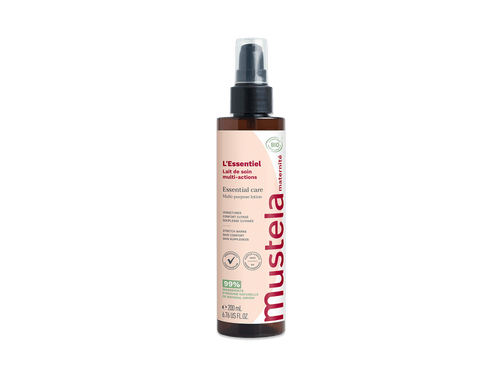Pregnancy brings about a number of changes to your body — swollen ankles, sore back, and constant pressure on your bladder. But for many women, nausea, or morning sickness, can be the most unpleasant symptom of the entire 9 months.
To add insult to injury, there’s the name “morning sickness.” Whoever put those two words together really got it wrong! It’s not uncommon for that sick feeling to persist well into the afternoon or evening making “morning sickness” feel like “all-day sickness”.
Thankfully, nausea during pregnancy doesn’t have to be a 24-hour thing. There are a number of cures you can try right at home without expensive medications or time-consuming doctor visits. Here are14 tips to help you get rid of morning sickness.
14 Cures For Morning Sickness
1) Have Breakfast In Bed
Oddly enough, you may feel the most nausea first thing in the morning, even though you haven’t eaten anything for 6-8 hours. Why is that? That hungry feeling you get first thing in the morning, along with the low blood sugar that goes with it, is your body’s way of saying, “Feed me!”
But when you’re pregnant, both an empty stomach and low blood sugar can make morning sickness worse. And it certainly doesn’t get any better when you get up and start moving around.
Want a simple solution for nausea first thing in the morning? Eat breakfast in bed. Yes, you read that correctly. Eat breakfast in bed. We recommend sticking with dry products like toast or cereal.
They might not be your first choice for breakfast, but those foods actually do two things: they provide your body with quick calories that boost blood sugar levels and they absorb some of the acids associated with feeling like you want to throw up.
2) Eat Smaller Meals More Frequently
Most of us were raised with the habit of eating three meals a day — breakfast, lunch, and dinner — with maybe a small snack or two thrown in to get us through the day. But that’s for people who aren’t eating for two.
When you’re pregnant, things are different. Instead of the standard three meals a day that you’re used to, we recommend eating smaller meals more frequently. At this point, you may be asking yourself, “Why would eating smaller meals more frequently help with morning sickness?” Great question! Here’s the answer.
Eating 5 or 6 (or more) small meals a day will help stabilize your blood sugar levels. This will keep you from being too hungry and too full — both feelings that can make morning sickness worse.
In addition, when you eat anti-nausea foods consistently throughout the day, the discomfort associated with morning sickness can be significantly reduced. And if you’re wondering exactly what those anti-nausea foods are, don’t worry, we’ll get to them soon.
The easiest way to get started eating more frequently is to include one small meal between breakfast and lunch, and another small meal between lunch and dinner. If you still find yourself craving food at the end of the day, eat a small snack a few hours after dinner. If that’s still not enough, try including a small meal in bed before your regular breakfast.

3) Chew Your Food To Cure Morning Sickness
Before you were pregnant, you probably didn’t give much thought to chewing your food. You just put it in your mouth, chomped on it a few times with your teeth, swallowed it, and moved on to the next bite so you didn’t miss your next appointment (that’s why they made drive-thrus, right?).
But when you’re pregnant, that old habit of only chewing your food a few times can make your nausea worse. When it comes to digestion, chewing serves two purposes:
- Chewing breaks food into smaller, more manageable pieces so it’s easier to digest.
- Chewing allows saliva to soften food before it reaches the stomach and makes digestion easier.
So when you don’t chew your food thoroughly, your stomach has to work harder to digest. This extra effort can lead to an upset stomach and nausea. As a rule of thumb, try chewing each mouthful of food 30 times before swallowing. Chewing your food 30 times before swallowing makes digestion easier and can reduce the nausea associated with pregnancy.
This may seem like a lot, but ask yourself, “Would I rather take my time and chew my food completely, or rush through my meal and feel nauseated for the whole day?” We know how we’d answer.
4) Guard Against Unpleasant Smells
When you’re pregnant, you expect your body to change. But who knew that your sensitivity to smells would change as well? The hormonal changes that accompany pregnancy can even turn once-appealing smells into unpleasant, even intolerable, nausea triggers.
That means that the smell of your favorite meal may now make you want to throw up. Talk about frustrating!
If you find that your sense of smell is becoming more sensitive, we suggest you avoid heavy odors like tobacco, perfumes, and exhaust from vehicles. If you encounter a smell that triggers your nausea, excuse yourself as quickly as possible and find fresh air away from the odor.
If you can’t get away from the trigger smell, try breathing through your mouth instead of your nose. And don’t worry about what others may think if you have to excuse yourself. They’re not pregnant.
5) Get Plenty Of Sleep
As a general rule, nausea tends to increase with fatigue and stress. This happens because your body uses its energy reserves to keep you going (when you’re tired) and to keep you calm (when you’re stressed). So to combat the nausea associated with fatigue and stress, we recommend getting plenty of sleep.
Here are three great ways to do that:
- Head to bed at the first sign of sleepiness.
- Turn off all electronic devices at least 20 minutes before lights out.
- Lower the temperature in your bedroom to around 65 degrees.
Done together, these suggestions will make it easy for your overworked body to get the rest, relaxation, and repair it desperately needs.
But what if you feel tired during the day? Our best suggestion is a simple one: nap when you’re tired. Even just a short 20-minute power nap at your desk or in your favorite chair can work wonders for your mental and physical well-being.
Put simply: Nap now while you can. You may not get the chance once the baby arrives.
6) Stay Hydrated
There’s no question about it: proper hydration is crucial for your health and for the health of your baby. But staying hydrated while you’re pregnant requires that you do more than just drinking whatever liquid sounds good at the time. That’s because your first choices might not be the best choices.
Coffee and soda are chocked full of caffeine that can make you dehydrated. Milk can upset your stomach even further. And sports drinks are often more sugary than anything else.
So when it comes to staying hydrated during your pregnancy, plain water is your best friend. We’ve found that the best solution is to drink at least a ½ gallon of water (about 6 cups) each day. To get these 6 cups of water, try sipping from a water bottle all day long.
And to further guard against nausea, avoid drinking for 20 minutes before you eat, while you eat, or for 20 minutes after you eat.
7) Include Anti-Nausea Foods In Your Diet
While your cravings may drive you to pickles and ice cream, nausea can be prevented by avoiding those strange combinations and eating anti-nausea foods instead. Foods like ginger, fresh vegetables and fruits, soups, and healthy fats can give your body the nutrients it needs while fighting off the effects of nausea.
These nutritious and delicious foods are a great addition to any diet, whether you’re pregnant or not.
Try grating fresh ginger on top of a few meals or sipping a ginger tea. Eat at least three fruits and vegetables per day. And be sure to eat healthy fats like nuts, seeds, avocado, olive oil, and coconut oil every day.
8) Go For A Short Walk

Light exercise like walking is one of our favorite cures for morning sickness. Walking is especially good for pregnant women because it doesn’t require a lot of equipment, is low impact, and gets the blood moving.
Dr. Michele Hakakha, an Ob/Gyn and author of Expecting 411, says, “Even walking [just] 20 minutes a day can help release endorphins [that] counteract fatigue and nausea.” Try planning a walk for the times of day when you feel most sick.
If mornings are the worst, a short walk after your breakfast in bed can serve two purposes: the walking itself can help reduce morning sickness while at the same time helping with digestion. If 20 minutes at a stretch is too long, try taking smaller walks (5 or 10 minutes) throughout the day to keep the sick feelings at bay.
9) Take Your Prenatal Vitamin At Dinner
Most of us are used to taking a vitamin in the morning with breakfast so that our body can make use of the nutrients throughout the day. But when you’re pregnant, that influx of vitamins and minerals can actually make your nausea worse.
Instead of taking your prenatal vitamin in the morning, we recommend taking it at night with dinner. Taking your vitamin at night works better because your body has been digesting all day long so the vitamin isn’t such a shock to your system. And taking that prenatal vitamin with a meal helps your body break it down more effectively.
Put both of those things together and you won’t feel quite so uneasy.
10) Try Peppermint Aromatherapy

Pregnant women exposed to the aroma of peppermint noted that their level of nausea decreased. Make sure you have a handful of peppermints closeby so when you start to feel nauseous, you can easily reach for a peppermint to help minimize your symptoms.
If you have peppermint oil and a diffuser, you can diffuse peppermint oil throughout the day. Note: peppermint oil is strong, so be cautious and use a carrier oil if you apply it directly to your skin.
11) Take A Vitamin B6 Supplement
Taking a B6 supplement is a good alternative if you want to avoid anti-nausea medications while you’re pregnant. Vitamin B6, also known as pyridoxine, successfully reduces nausea during pregnancy.
Vitamin B6 supplements are available in the form of a pill that you can typically find at your local store. Doses of vitamin B6 up to 200 mg per day are generally considered safe during pregnancy with practically no side effects.
12) Eat Bland Foods
Bland foods — such as crackers, dry cereal, and pretzels — are gentle on your stomach. Reaching for bland foods first thing in the morning may help ease your nausea symptoms.
Some women have also found relief from nausea also through cold treats, such as watermelon, Popsicles, or pickles. Each nausea case is different, so find what soothes your stomach.
Other suggestions for bland foods:
- Broth
- Plain baked potato
- Whole-wheat toast
13) Listen To Your Body

Your body will tell you what’s working and what’s not. You’ll quickly find out what kinds of foods, smells, and drinks you can tolerate and what you cannot.
Listen to your body when you’ve had enough food or need more. If you’re craving something during your pregnancy, your body could be telling you that you’re lacking nutrients in a particular area.
14) Try Sea-Bands
Maybe you’ve heard of people using Sea-Bands for nausea during travel, but what about using them for nausea during pregnancy?
Sea-Band Wristbands are comfortable and all-natural elastic wristbands that have a plastic knob placed on the inside. This plastic knob is what puts pressure on the Nei Guan point in your wrist to gently restore balance to your body.
The Nei Guan pressure point, located three finger-lengths below your wrist on your inner forearm between the two tendons, is known for its ability to relieve nausea and other stomach issues.
This is a drug-free solution to find relief from nausea, queasiness, upset stomach, motion sickness, and morning sickness.
What Now?

While there’s no cure-all solution for morning sickness, the baby experts at Mustela have given you 14 effective treatments to choose from. Remember, this will eventually pass, but we know that doesn’t lessen the severity of your nausea during right now. Review the list above to find some relief in the meantime.
If your nausea is severe, reach out to your doctor and discuss your symptoms. But before you know it, your little one will be here and you won’t even remember this difficult time in your pregnancy. It will all be worth it once your baby is in your arms!












